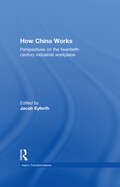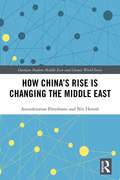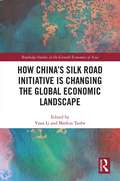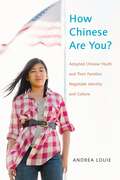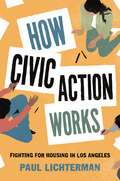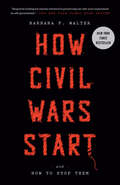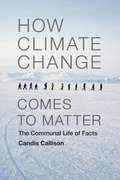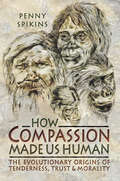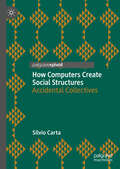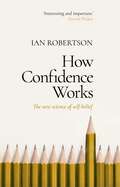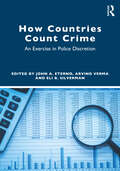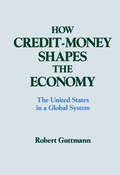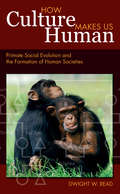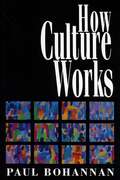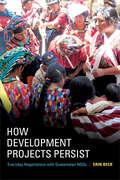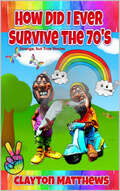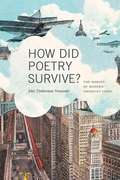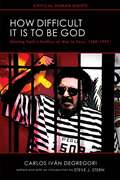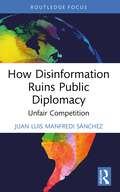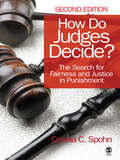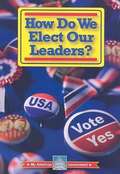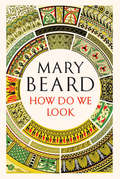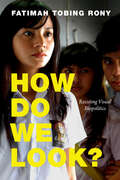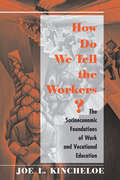- Table View
- List View
How China Works: Perspectives on the Twentieth-Century Industrial Workplace (Routledge Studies in Asia's Transformations #Vol. 12)
by Jacob EyferthSpanning the whole of the twentieth century, How China Works examines the labour issues surrounding the workplace in China in both the Republican and People's Republic epochs. The international team of contributors treat China's twentieth-century revolution as an industrial revolution, stressing that China's recent emergence as the new workshop of the world was a gradual change, and not a recent phenomena led by external forces. Providing the reader with extensive ethnographic research on topics such as culture and community in the workplace, the rural-urban divide, industrialization, subcontracting and employment practices, How China Works really does ground the study of Chinese work in the daily interactions in the workplace, the labour process and the micropolitics of work.
How China's Rise is Changing the Middle East (Durham Modern Middle East and Islamic World Series)
by Anoushiravan Ehteshami Niv HoreshThis book explores the extent to which China’s rise is changing the economic, security, political, and social-cultural aspects of the Middle East – a region of significant strategic importance to the West and of increasing importance to the East. With its growing dependence on Middle East oil and gas, China has more at stake in this region than any other Asian power and, not surprisingly, has begun increasing its engagement with the region, with profound implications for other stakeholders. The book charts the history of China’s links with the Middle East, discusses China’s involvement with each of the major countries of the region, considers how China’s rise is reshaping Middle Easterners’ perceptions of China and the Chinese people, and examines the very latest developments.
How China's Silk Road Initiative is Changing the Global Economic Landscape (Routledge Studies in the Growth Economies of Asia)
by Yuan Li Markus TaubeChina’s New Silk Road initiative constitutes one of the most ambitious projects in recent decades designed to change the pattern of the global economic division of labour as well as the geostrategic balance of power. It has the potential to create a new fabric of industrial value creation that links China and East Asia via Central and South Asia with Europe, and to forge new regional and multilateral institutions that complement or compete with existing regional and global governance systems. First proposed in 2013, the new initiative is only now starting to be rolled-out, with trade relations gradually intensifying, and the first investment projects and infrastructure clusters becoming manifest. However, the full impact of the evolving new regional value chains on global goods flows, investment activity, supra-national institution building, as well as their wider international implications, remains undetermined. This book brings together leading scholars from economics, political science and area studies, who present the latest cutting-edge knowledge and the latest state-of-the-art economic and political analysis on how the new initiative is developing and likely to develop.
How Chinese Are You?: Adopted Chinese Youth and their Families Negotiate Identity and Culture
by Andrea LouieChinese adoption is often viewed as creating new possibilities for the formation of multicultural, cosmopolitan families. For white adoptive families, it is an opportunity to learn more about China and Chinese culture, as many adoptive families today try to honor what they view as their children’s “birth culture.” However, transnational, transracial adoption also presents challenges to families who are trying to impart in their children cultural and racial identities that they themselves do not possess, while at the same time incorporating their own racial, ethnic, and religious identities. Many of their ideas are based on assumptions about how authentic Chinese and Chinese Americans practice Chinese culture. Based on a comparative ethnographic study of white and Asian American adoptive parents over an eight year period, How Chinese Are You? explores how white adoptive parents, adoption professionals, Chinese American adoptive parents, and teens adopted from China as children negotiate meanings of Chinese identity in the context of race, culture, and family. Viewing Chineseness as something produced, rather than inherited, Andrea Louie examines how the idea of “ethnic options” differs for Asian American versus white adoptive parents as they produce Chinese adoptee identities, while re-working their own ethnic, racial, and parental identities. Considering the broader context of Asian American cultural production, Louie analyzes how both white and Asian American adoptive parents engage in changing understandings of and relationships with “Chineseness” as a form of ethnic identity, racial identity, or cultural capital over the life course. Louie also demonstrates how constructions of Chinese culture and racial identity dynamically play out between parents and their children, and for Chinese adoptee teenagers themselves as they “come of age.” How Chinese Are You? is an engaging and original study of the fluidity of race, ethnicity, and cultural identity in modern America.
How Civic Action Works: Fighting for Housing in Los Angeles (Princeton Studies in Cultural Sociology #9)
by Paul LichtermanThe ways that social advocates organize to fight unaffordable housing and homelessness in Los Angeles, illuminated by a new conceptual framework for studying collective actionHow Civic Action Works renews the tradition of inquiry into collective, social problem solving. Paul Lichterman follows grassroots activists, nonprofit organization staff, and community service volunteers in three coalitions and twelve organizations in Los Angeles as they campaign for affordable housing, develop new housing, or address homelessness. Lichterman shows that to understand how social advocates build their campaigns, craft claims, and choose goals, we need to move beyond well-established thinking about what is strategic.Lichterman presents a pragmatist-inspired sociological framework that illuminates core tasks of social problem solving, both contentious and noncontentious, by grassroots and professional advocates alike. He reveals that advocates’ distinct styles of collective action produce different understandings of what is strategic, and generate different dilemmas for advocates because each style accommodates varying social and institutional pressures. We see, too, how patterns of interaction create a cultural filter that welcomes some claims about housing problems while subordinating or delegitimating others. These cultural patterns help solve conceptual and practical puzzles, such as why coalitions fragment when members agree on many things, and what makes advocacy campaigns separate housing from homelessness or affordability from environmental sustainability. Lichterman concludes by turning this action-centered framework toward improving dialogue between social advocates and researchers.Using extensive ethnography enriched by archival evidence, How Civic Action Works explains how advocates meet the relational and rhetorical challenges of collective action.
How Civil Wars Start: And How to Stop Them
by Barbara F. WalterA leading political scientist examines the dramatic rise in violent extremism around the globe and sounds the alarm on the increasing likelihood of a second civil war in the United States. <p><p> Political violence rips apart several towns in southwest Texas. A far-right militia plots to kidnap the governor of Michigan and try her for treason. An armed mob of Trump supporters and conspiracy theorists storms the U.S. Capitol. Are these isolated incidents? Or is this the start of something bigger? Barbara F. Walter has spent her career studying civil conflict in places like Iraq and Sri Lanka, but now she has become increasingly worried about her own country. <p><p> Perhaps surprisingly, both autocracies and healthy democracies are largely immune from civil war; it’s the countries in the middle ground that are most vulnerable. And this is where more and more countries, including the United States, are finding themselves today. <p><p> Over the last two decades, the number of active civil wars around the world has almost doubled. Walter reveals the warning signs—where wars tend to start, who initiates them, what triggers them—and why some countries tip over into conflict while others remain stable. Drawing on the latest international research and lessons from over twenty countries, Walter identifies the crucial risk factors, from democratic backsliding to factionalization and the politics of resentment. A civil war today won’t look like America in the 1860s, Russia in the 1920s, or Spain in the 1930s. It will begin with sporadic acts of violence and terror, accelerated by social media. It will sneak up on us and leave us wondering how we could have been so blind. <p><p> In this urgent and insightful book, Walter redefines civil war for a new age, providing the framework we need to confront the danger we now face—and the knowledge to stop it before it’s too late.
How Climate Change Comes to Matter: The Communal Life of Facts
by Candis CallisonDuring the past decade, skepticism about climate change has frustrated those seeking to engage broad publics and motivate them to take action on the issue. In this innovative ethnography, Candis Callison examines the initiatives of social and professional groups as they encourage diverse American publics to care about climate change. She explores the efforts of science journalists, scientists who have become expert voices for and about climate change, American evangelicals, Indigenous leaders, and advocates for corporate social responsibility.The disparate efforts of these groups illuminate the challenge of maintaining fidelity to scientific facts while transforming them into ethical and moral calls to action. Callison investigates the different vernaculars through which we understand and articulate our worlds, as well as the nuanced and pluralistic understandings of climate change evident in different forms of advocacy. As she demonstrates, climate change offers an opportunity to look deeply at how issues and problems that begin in a scientific context come to matter to wide publics, and to rethink emerging interactions among different kinds of knowledge and experience, evolving media landscapes, and claims to authority and expertise.
How Compassion Made Us Human: The Evolutionary Origins of Tenderness, Trust & Morality
by Penelope SpikinsAn intriguing look at how our capacity to care about and connect with others has contributed to our evolutionary success as a species. Our ability to care about the wellbeing of others, whether they are close family or strangers, can appear to be unimportant in today&’s competitive societies. But in this volume, archaeologist Penny Spikins argues that compassion lies at the heart of what makes us human. She takes us on a journey from the earliest Stone Age societies two million years ago to the lives of Neanderthals in Ice Age Europe, using archaeological evidence to illustrate the central role that emotional connections had in human evolution. Simple acts of kindness left to us from millions of years ago provide evidence for how social emotions and morality evolved, and how our capacity to reach out beyond ourselves into the lives of others allowed us to work together for a common good—and form the basis for human success.
How Computers Create Social Structures: Accidental Collectives
by Silvio CartaThis book introduces the idea of accidental collectives: the grouping of people that occurs as a by-product of the automated work of computers. Software has a growing influence in our lives automating and optimising mundane, time-consuming and repetitive tasks. In doing this, groups of people are automatically created as the result of classification and data analysis. Once grouped by the invisible agency of software, people interact and establish new relationships, generating new collectives and communities. With the support of case studies and real-life examples, this work explores the accidental nature of the generation of new social groups and questions the role of software in social interactions.
How Confidence Works: The new science of self-belief
by Ian Robertson* Confidence makes your brain work better and boosts your performance* Confidence acts like a mini-antidepressant, lifting your mood* Confidence is contagious* Confidence is anxiety's greatest antidote* Confidence is a set of habits that feel fake at first but become real with practice* Confidence makes boys bullsh*t more than girls* Overconfidence can have disastrous consequences_________'Brilliant ... it will change how you think about confidence.' Johann Hari'Important for everyone but crucial for women.' Mary Robinson'Interesting and important.' Steven Pinker__________Imagine we could discover something that could make us richer, healthier, longer-living, smarter, kinder, happier, more motivated and more innovative. Ridiculous, you might say... What is this elixir?Confidence.If you have it, it can empower you to reach heights you never thought possible. But if you don't, it can have a devastating effect on your future. Confidence lies at the core of what makes things happen.Exploring the science and neuroscience behind confidence that has emerged over the last decade, clinical psychologist and neuroscientist Professor Ian Robertson tells us how confidence plays out in our minds, our brains and indeed our bodies. He explains where it comes from and how it spreads - with extraordinary economic and political consequences. And why it's not necessarily something you are born with, but something that can be learned.__________'Rich stories and change-inspiring examples for every kind of performer.' Pippa Grange'Appealing... ranges from neuroscience to politics.' Nature
How Countries Count Crime: An Exercise in Police Discretion
by Arvind Verma John A. Eterno Eli B. SilvermanThis edited collection illuminates the weaknesses and strengths of crime reporting across a wide range of countries, with a focus on democratic countries in which the police bear some accountability to citizens. In one compendium, for the first time, this book documents how different countries record (or fail to record) crimes. With chapters written by native authors who are experts on the practices of their respective countries, the book explores practices in 15 different countries across the globe. Organized with a parallel, country-by-country approach, the book describes and analyzes methods police use to record crimes, with the awareness that the counting of crimes is not only an issue of empirical measurement, but also one of social construction. Crime reporting practices vary widely by country. In some cases, reports are not taken, and in others, reports are carefully based on preliminary investigations. Willful manipulation of crime reports can and does occur, and the book explores related factors such as political pressure, personal ambition, community safety, and more. Discussion questions at the end of each chapter help the reader evaluate the significant issues influencing each country. The editors conclude by suggesting best practices for crime reporting and the collection of crime data. A unique addition to this book is a foreword by Tofiq Murshudlu, the Head of Drugs and Crime for the United Nations in Vienna. The book is intended for a wide range of audiences, including policing scholars, law enforcement and community leaders, and students of criminal justice.
How Credit-money Shapes the Economy: The United States in a Global System
by Robert GuttmannThis text examines money, credit, and economic activity in the increasingly integrated global economy. It focuses on the problems afflicting the United States as it adapts to the transformation of the world economy.
How Culture Makes Us Human: Primate Social Evolution and the Formation of Human Societies (Key Questions in Anthropology #3)
by Dwight W ReadWhat separates modern humans from our primate cousins—are we a mere blink in the march of evolution, or does human culture represent the definitive evolutionary turn? Dwight Read explores the dilemma in this engaging, thought-provoking book, taking readers through an evolutionary odyssey from our primate beginnings through the development of culture and social organization. He assesses the two major trends in this field: one that sees us as a logical culmination of primate evolution, arguing that the rudiments of culture exist in primates and even magpies, and another that views the human transition as so radical that the primate model provides no foundation for understanding human dynamics. Expertly synthesizing a wide body of evidence from the anthropological and life sciences in accessible prose, Read’s book will interest a broad readership from experts to undergraduate students and the general public.
How Culture Works
by Paul BohannanProvides a step-by-step blueprint of cultural dynamics, defining the boundaries between matter and life, life and culture, and animal culture versus human culture. With all these basic concepts the author sets the stage for a renewal of anthropological enquiry.
How Development Projects Persist: Everyday Negotiations with Guatemalan NGOs
by Erin BeckIn How Development Projects Persist Erin Beck examines microfinance NGOs working in Guatemala and problematizes the accepted wisdom of how NGOs function. Drawing on twenty months of ethnographic fieldwork, she shows how development models and plans become entangled in the relationships among local actors in ways that alter what they are, how they are valued, and the conditions of their persistence. Beck focuses on two NGOs that use drastically different methods in working with poor rural women in Guatemala. She highlights how each program's beneficiaries—diverse groups of savvy women—exercise their agency by creatively appropriating, resisting, and reinterpreting the lessons of the NGOs to match their personal needs. Beck uses this dynamic—in which the goals of the developers and women do not often overlap—to theorize development projects as social interactions in which policymakers, workers, and beneficiaries critically shape what happens on the ground. This book displaces the notion that development projects are top-down northern interventions into a passive global south by offering a provocative account of how local conditions, ongoing interactions, and even fundamental tensions inherent in development work allow such projects to persist, but in new and unexpected ways.
How Did I Ever Survive the 70's: Strange, but True Stories
by Clayton Matthews<p>Humorous personal essays detailing a teenaged boy’s coming of age in the 1970s, an era defined by sexual liberation and drug experimentation.<p> <p>Clayton Matthews, if that’s his real name, was a child of the ‘70s. He smoked pot, drove fast cars, and chased women. In this hilarious collection of essays detailing his misspent youth, Matthews looks back at a decade where bell bottoms, free love and LSD were all the rage. A self-proclaimed hippie from a small Midwestern town, Matthews’s no-holds-barred account of everything from sexual exploits to acid trips will have readers young and old relishing a time when the counterculture of the ‘60s had become the mainstream of the 70s, and sex, drugs and rock and roll were a way of life.<p>
How Did Poetry Survive?: The Making of Modern American Verse
by John Timberman NewcombThis book traces the emergence of modern American poetry at the turn of the nineteenth century. With a particular focus on four "little magazines"--Poetry, The Masses, Others, and The Seven Arts--John Timberman Newcomb shows how each advanced ambitious agendas combining urban subjects, stylistic experimentation, and progressive social ideals. While subsequent literary history has favored the poets whose work made them distinct--individuals singled out usually on the basis of a novel technique--Newcomb provides a denser, richer view of the history that hundreds of poets made.
How Difficult It Is to Be God
by Carlos Iván DegregoriThe revolutionary war launched by Shining Path, a Maoist insurgency, was the most violent upheaval in modern Peru’s history, claiming some 70,000 lives in the 1980s–1990s and drawing widespread international attention. Yet for many observers, Shining Path’s initial successes were a mystery. What explained its cult-like appeal, and what actually happened inside the Andean communities at war? InHow Difficult It Is to Be God,Carlos Iván Degregori—the world’s leading expert on Shining Path and the intellectual architect for Peru’s highly regarded Truth and Reconciliation Commission—elucidates the movement’s dynamics. An anthropologist who witnessed Shining Path’s recruitment of militants in the 1970s, Degregori grounds his findings in deep research and fieldwork. He explains not only the ideology and culture of revolution among the insurgents, but also their capacity to extend their influence to university youths, Indian communities, and competing social and political movements. Making Degregori’s most important work available to English-language readers for the first time, this translation includes a new introduction by historian Steve J. Stern, who analyzes the author’s achievement, why it matters, and the debates it sparked. For anyone interested in Peru and Latin America’s age of “dirty war,” or in the comparative study of revolutions, Maoism, and human rights, this book will provide arresting new insights.
How Disinformation Ruins Public Diplomacy: Unfair Competition (Politics, Media and Political Communication)
by Juan Luis Manfredi SánchezHow Disinformation Ruins Public Diplomacy evaluates and analyzes how Chinese and Russian public diplomacy strategies differ from the existing academic literature and debates, specifically in the context of the new disinformation era.In the context of mediatized public diplomacy, disinformation, and deglobalization, this book asks: do China, Russia, and new emerging powers take advantage by employing values and techniques attributed to public diplomacy? What if goals (dialogue and cooperation) are settled on an unfair basis (false content, meddling, and institutional erosion)? Can their repertoire of actions be considered public diplomacy? And if their initiatives are not public diplomacy, what impact do their actions have on the theoretical construction of the discipline? While using China and Russia as the two main case studies in order to develop a new theory, this book covers other relevant cases on the management of public diplomacy for other purposes. The case of Turkey provides a model of transformation and adaptation of public diplomacy, with Erdogan's hyper-leadership built on anti-Western rhetoric and the emergence of a new Ottomanism. The case of India explores Modi’s creation of an ethnically-branded democracy which places Hinduism at the heart of political decisions. In the case of Morocco, its positioning in religious dialogue, the establishment of relations and political normalization with Israel, and territorial unity (Western Sahara) are explored.Exploring how authoritarian powers abuse the global disinformation order to achieve their public diplomacy goals, this book will be of great interest to students and scholars of international relations, politics, public diplomacy, communication studies, and social theory. In the professional sphere it will also appeal to politicians, diplomats, foreign policy makers, think-tanks, journalists, and foreign correspondents.
How Do Judges Decide?: The Search for Fairness and Justice in Punishment
by Cassia C. SpohnHow are sentences for federal, state, and local crimes determined? Is this process fairly and justly applied to all concerned? How have reforms affected the process over the last 25 years? Offering a comprehensive overview of the sentencing process in the United States, How Do Judges Decide? The Search for Fairness and Justice in Punishment explores these questions and more. Author Cassia Spohn first discusses the overall concept of punishment and then analyzes individual aspects of it, including the sentencing process, the responsibility of the judge, and disparity and discrimination in sentencing. This Second Edition offers new information on the impact of sentencing reforms, including recent research and case law, updated statistics in tables and figures, and new boxed highlights. Key Features Helps students understand patterns in the wide discretion and latitude given to judges when determining penalties within the framework of the U.S. judicial system Engages the reader with "Focus on an Issue" sections, which analyze key issues such as gender and sentencing (Ch.4) and the impact of race on sentencing for drug offenses (Ch.5) Examines sentencing reforms and their impact, providing students with up-to-date information on how punishment is meted out in U.S. courts. Contains boxed excerpts in each chapter from books and articles, with a variety of case studies on topics such as the O.J. Simpson murder trial, judicial surveys, and comparison of sentences in different jurisdictions by gender Offers new material on specialty courts and the prosecutor's role in sentencing Concludes each chapter with discussion questions How Do Judges Decide? is an ideal text for upper-division undergraduate and graduate courses on the judicial system, criminal law, and law and society.
How Do We Elect Our Leaders? (My American Government)
by William David ThomasIn what ways are the branches of government like a basketball game? How can a school yard game's rules liken themselves to a constitution? Through engaging analogies and introductions, our new government series gets students ready for election 2008. Correlated to the fourth and fifth grade social studies curriculum, My American Government introduces students to how our government works. Students learn about the U.S. Constitution, the branches of government, citizens' basic rights, and how we elect our leaders.
How Do We Look: The Body, The Divine, And The Question Of Civilization
by Mary BeardFrom prehistoric Mexico to modern Istanbul, Mary Beard looks beyond the familiar canon of Western imagery to explore the history of art, religion, and humanity. Conceived as a gorgeously illustrated accompaniment to “How Do We Look” and “The Eye of Faith,” the famed Civilisations shows on PBS, renowned classicist Mary Beard has created this elegant volume on how we have looked at art. Focusing in Part I on the Olmec heads of early Mesoamerica, the colossal statues of the pharaoh Amenhotep III, and the nudes of classical Greece, Beard explores the power, hierarchy, and gender politics of the art of the ancient world, and explains how it came to define the so-called civilized world. In Part II, Beard chronicles some of the most breathtaking religious imagery ever made—whether at Angkor Wat, Ravenna, Venice, or in the art of Jewish and Islamic calligraphers— to show how all religions, ancient and modern, have faced irreconcilable problems in trying to picture the divine. With this classic volume, Beard redefines the Western-and male-centric legacies of Ernst Gombrich and Kenneth Clark.
How Do We Look?: Resisting Visual Biopolitics (a Camera Obscura book)
by Fatimah Tobing RonyIn How Do We Look? Fatimah Tobing Rony draws on transnational images of Indonesian women as a way to theorize what she calls visual biopolitics—the ways visual representation determines which lives are made to matter more than others. Rony outlines the mechanisms of visual biopolitics by examining Paul Gauguin’s 1893 portrait of Annah la Javanaise—a trafficked thirteen-year-old girl found wandering the streets of Paris—as well as US ethnographic and documentary films. In each instance, the figure of the Indonesian woman is inextricably tied to discourses of primitivism, savagery, colonialism, exoticism, and genocide. Rony also focuses on acts of resistance to visual biopolitics in film, writing, and photography. These works, such as Rachmi Diyah Larasati’s The Dance that Makes You Vanish, Vincent Monnikendam’s Mother Dao (1995), and the collaborative films of Nia Dinata, challenge the naturalized methods of seeing that justify exploitation, dehumanization, and early death of people of color. By theorizing the mechanisms of visual biopolitics, Rony elucidates both its violence and its vulnerability.
How Do We Tell The Workers?: The Socioeconomic Foundations Of Work And Vocational Education
by Joe KincheloeThis book analyzes the ways that workers are educated," via a variety of institutions, to fit into the contemporary labour-unfriendly economic system. As he examines the history and purposes of vocational education, Kincheloe illustrates the manner in which this education shapes the politics of the era. How Do We Tell the Workers? is important reading for policy makers, labour leaders, and educators.
